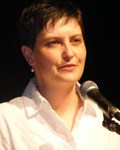
Top stories






More news

ESG & Sustainability
#AGES2026: How to back Africa's next-gen green and blue entrepreneurs




















Logistics & Transport
#Budget2026: Road freight logistics and what it means for consumers

I'm happy for my daughter to call them robots - she's South African after all and in South African English, robot is a perfectly acceptable word for a traffic light - but only in South Africa. English-speakers in other parts of the world call them traffic lights.
My husband sticks to traffic lights - it's what he grew up with outside South Africa and he feels that robot is wrong.
Anyone heard of a Pelican Crossing (rather than the more usual Zebra Crossing)? I was amazed to find this in the Oxford South African Concise Dictionary. I firmly believed my husband had made it up to pull my leg, but there it was - neatly defined as "a pedestrian crossing with traffic lights operated by pedestrians". In use in England, but unknown to me in South Africa. Now that I know what the word means, I can easily associate it with the childish pleasure of pushing the black button in the yellow surround to make the little green man come out and the traffic stop.
Can singer Simphiwe Dana be serious about abandoning her mother tongue in favour of isiZulu, as she discussed in the Sunday Times at the end of last year? Her argument began from her difficulty in finding a good school in Cape Town for her children where they could study isiXhosa as a home language, rather than as an additional language. Perhaps, she felt, if there was just one African language used at school, it would be offered more widely to all learners no matter what their home language. And as a quarter of South Africans already speak isiZulu as their home language (with many more able to use it as an additional language), it seemed like a logical place to start. And it is logical.
But we are not only logical beings. And our attachments and associations with our home languages - our mother tongues - go way beyond logic, right back to our proverbial existence as babies, lulled by our mother's voices, audible in the womb even before birth.
How many people would willingly let go of these mother tongues that carry the freight of so many memories? Most South Africans have already lived through too many years of being offered education only in a language or languages in which they are not fluent, or perhaps even competent, in languages that have negative associations, that make them feel unsure or frustrated, unable to convey their knowledge or express their ideas. Would isiZulu be any better than Afrikaans if your home language is Setswana? Would isiZulu be any better than English, if your home language is isiNdebele?
Perhaps. Perhaps, as Simphiwe says, having an African language, even if it isn't one's own African language, would be better than having a language with a colonial and apartheid history.
Perhaps people's own home languages could be maintained as oral languages, whatever children are learning at school - much as they are now actually, when most South Africans learn through the medium of English, but speak an African language at home and in the playground.
But what is lost in the longer term by knowing one's mother tongue as a spoken language only? By being unable to read a novel, a poem, a newspaper article, children's story or folklore in one's home language? By being unable to write a letter, shopping list, love note, speech, SMS or essay in the language most familiar to you? (And if children aren't taught how to write their home language, we must realise, they won't be able to do any of these things, because a spelling system is a construct, not something that comes naturally without teaching.)
By being known only orally, a language loses its potential novelists, playwrights and poets - and its speakers lose their potential texts, the potential written reflection of their own experiences and speech. And once its creative users are no longer using it in a written form, will its storytellers continue to use it? And even if they do, what record of their creativity is left for speakers 10, 20 or 50 years later, to reflect on and enjoy?
Being known only orally seems to me the first step on the path of language obliteration in a world that relies so heavily on the written word (whether it's in a printed book, SMS or other electronic form). With adults and children both conducting large parts of their lives in other languages, a language must lose some of its richness, its deep idiom, its allusive qualities, as it is used in fewer domains and for fewer purposes.
And here Simphiwe is entirely right - it's up to every parent, every adult, every teacher to encourage learners to protect and grow languages by learning them. To show by example the value that languages with such strong emotive ties have. To show by using them. To show by reading books, newspapers, websites in them (not every African language may have a newspaper or websites, but some have both). To show by writing letters, emails, songs (like Simphiwe's), poems, novels, essays and textbooks. To show by developing dictionaries in a range of African languages, as Oxford University Press is doing.
Because we are not robots, not mechanical people without emotions.
And because we instinctively know that it's true - "if you talk to a man in his language, that goes to his heart" (Nelson Mandela, speaking about why he learnt Afrikaans in prison) - and for that we all need better access to all South Africa's languages.
